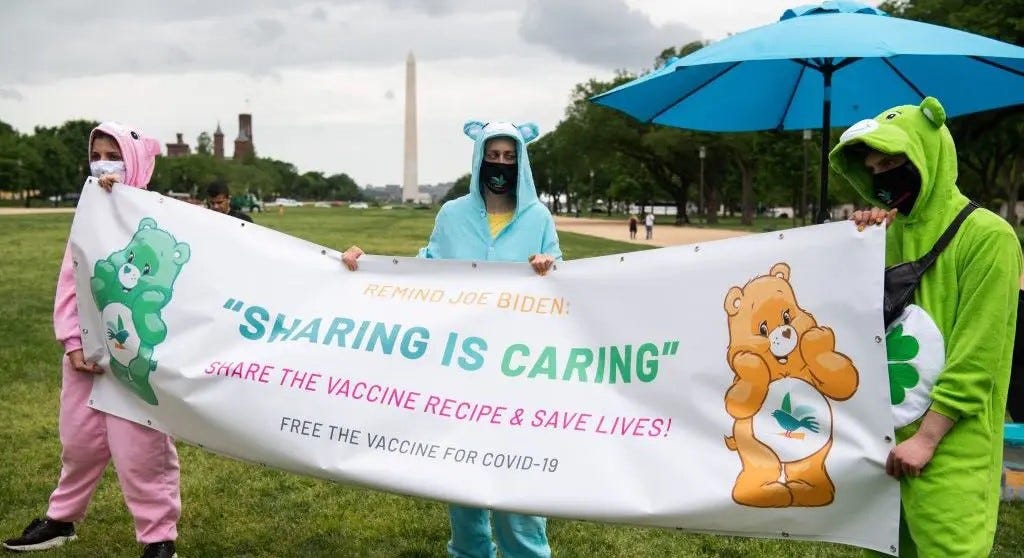An Age-Old Hatred of Profits Drives the Campaign To Seize Vaccine Patents
For pharmaceutical companies, no good deed goes unpunished, thanks to 18th century moral philosophers

Pfizer, Moderna and other companies quickly produced vaccines that are snuffing out the coronavirus pandemic in developed nations. We now have the luxury of turning our attention to poorer countries such as India, where the disease began spiraling out of control last month. So naturally, some people think they have identified the villains here: the companies that developed the vaccines. They are denouncing “pandemic profiteering” and making loud, angry demands to expropriate vaccine patents.
Supposedly, this movement to expropriate patents is about speeding up vaccinations in less-developed countries, but even if the patents were taken, it’s unlikely the supply of vaccines will increase. The bottleneck is not intellectual property rights but production capacity, particularly because the new mRNA vaccines require new processes and specialized equipment. Any random pharmaceutical factory cannot simply start production.
What’s more, does anyone really think the vaccine manufacturers are arbitrarily holding out on us, that they are not manufacturing as much as they can as quickly as they can, or that they are unwilling to license their vaccines to other manufacturers? In fact, Moderna announced late last year that for the duration of the pandemic, it would not enforce its COVID-related patents. The problem is that nobody else has the expertise and capacity to take advantage of this lack of enforcement.
A patent seizure is largely symbolic rather than practical, and its message is clear: No good deed goes unpunished. Seizing the patents tells us that people who develop a life-saving product do not deserve any reward. Isn’t that an astonishingly perverse idea?
Notice also that the Biden administration, which has jumped on the bandwagon of patent seizure, pushed through billions of dollars in coronavirus relief and has proposed trillions more in other spending. If the administration truly wanted to help bring the vaccines to the rest of the world—the kind of foreign aid that would not only earn the U.S. goodwill but also protect us from the evolution of deadlier variants of the virus—then among those trillions, it could have proposed a few billion to compensate the vaccine makers. Instead, it apparently prefers the more cumbersome and confrontational method of expropriation.
How Dare You Make a Profit
The real driver of this campaign is an animus against profit and profit-making. For economist Robert Reich, for example, the mere fact that Pfizer is making money seems in his mind to be indictment enough: “Unlike … vaccine manufacturers that vowed to forgo profits during the COVID-19 pandemic, Pfizer planned to profit. Today it announced that the vaccine brought in $3.5 billion in the first three months of 2021, nearly a quarter of the company’s total revenue,” the former U.S. labor secretary said in a May 4 tweet.
Note that this is revenue, not profit, but Reich assumes Pfizer is making a profit from its vaccine and takes it as self-evident that it shouldn’t. Indeed, Pfizer is making a profit. It made roughly 20%, or $700 million, in net income on its vaccine in the first quarter, based on information in its earnings release. And since it expects its vaccine to produce a total of $26 billion in revenue this year, the vaccine could generate $5.2 billion in net income in 2021.
That sounds like a lot of money, but let’s put it in context. The coronavirus recession induced a 3.5% contraction last year in a $21.5 trillion U.S. economy, meaning that it cost the U.S. close to $1 trillion in lost output. The International Monetary Fund estimated a 3.3% drop globally, meaning that we suffered $4.4 trillion in lost output worldwide last year. This is what a vaccine has the power to restore—to investors, to owners of businesses of all sizes, to the people who are out of work because of the pandemic.
So, after helping to restore $4.4 trillion in global economic value, the maker of one major vaccine stands to make perhaps $5.2 billion in profit this year—barely one-tenth of 1%. That’s a bargain.
Profits Keep Companies in Business
Contrary to the fanciful imaginings of anti-market folks, the makers and sellers of a product capture in profits only a small share of the value they create—mere pennies on the dollar. The average corporate profit margin is in the neighborhood of 7.5%. The median is even smaller, and both numbers are far, far smaller than most people think.
True, the profit margins for pharmaceutical companies tend to be higher, around 13%. Then again, they need to put a lot of money at risk, spending nearly a billion dollars on average for research and development and clinical trials on each new drug they develop. Would you prefer they stopped doing this? That’s what the argument against profit amounts to.
Anyone who has ever run a business, particularly a small one, knows that profits are not optional. It’s not just a manner of incentives or the “profit motive.” Without profits a business cannot continue to operate, no matter how incentivized or motivated its owners or employees might be. So there’s a simple rule. If you want more of something—like books or automobiles or vaccines—make sure someone can profit from it. If you want less of something, ban everyone from profiting from it, and watch the people who keep trying to provide it fail, one by one.
The usual excuse for the anti-profit crusade is that pharmaceutical companies benefit from government-funded scientific research, so in exchange for this “corporate welfare,” they owe the government the rights to the value of everything they produce. But this is like someone telling business owners “you didn’t build that” because they used government roads to drive to their factories.
The government may have built the roads, but it didn’t build or operate the factory. The government may put money into some underlying medical research, but that’s a long way from developing a vaccine, running large-scale trials to test it and then producing billions of doses. That process requires building a lot of infrastructure and hiring a lot of very talented employees bringing knowledge and experience accumulated over decades of making other drugs.
It also requires a lot of money put up by investors. Pfizer, for example, received a large order for its vaccine from the U.S. government—but no federal money for its development. Moderna received some federal funds but also raised more than $1 billion last May by selling stock, primarily to fund manufacturing and distribution of its vaccine. The people who invested in the stock need to earn a return, and that happens when the company makes a profit.
Pathological Altruism
The argument about government subsidies for research is just a rationalization for an attack on profits. Just as there are puritans who can’t stand that someone, somewhere might be having fun, there are economic puritans who can’t stand that someone, somewhere might be making money. This economic puritanism is motivated by pathological altruism.
We tend to think of altruism as merely concern for the welfare of others, but to the hardcore altruist, it doesn’t matter whether you’ve done something that benefits others. What matters is that you don’t benefit from it yourself. The 18th-century philosopher Immanuel Kant famously posited that an action is moral only if you do it “from duty,” that is, purely from a disinterested, impersonal motive. The moment you consider or welcome any benefit to yourself, the action is immoral, no matter what its consequences or who else benefits from it.
A few decades later, the man who coined the term “altruism,” Auguste Comte, declared that the rule of morality is “to live for others”—and he meant it in this puritanical way. As J. S. Mill summed up Comte’s philosophy, “To do as we would be done by, and to love our neighbor as ourself, are not sufficient for him…. We should endeavor not to love ourselves at all.”
Mill noted that Comte sought to turn this creed into a secular religion. Yet every previous religion has promised us a reward for our good deeds and punishment for our bad deeds, if not on earth, then in an afterlife. Kant and Comte created a completely inverted moral system in which we are punished for our good deeds—and any deed for which we are rewarded is automatically a sin.
If you are asking why I bring up the fevered notions of long-dead philosophers, it is because their ideas are not dead. The proposal to seize vaccine patents is the principles of Kant and Comte put into action. It may not help anyone, and in the long run it will probably hurt people by making a pharmaceutical company less likely to stick its neck out to develop another urgently needed medicine. But it will satisfy the puritanical longings of the moralists by punishing anyone who seeks a benefit for themselves in return for benefiting others.
The Greater the Benefit, the More Immoral the Profit?
In fact, in this outlook the more you benefit others, the more they need what you produce, the less right you have to derive any benefit yourself. While you and I might think that the enormous value liberated by a coronavirus vaccine more than justifies the reward of a profit, to the pathological altruist, the exact opposite is true. The government gets the right to seize a patent precisely because it’s valuable; otherwise we would be “leaving a life-saving industry in the hands of a profiteering monopoly.” The very fact that a product is life-saving, that it offers an enormous value to the world, is the reason why its creators are not entitled to any compensation.
Look at the same attitude applied to another issue: a proposal floated in New York City to levy a $3 surcharge on the delivery of packages during the pandemic—exactly the time when everyone was flocking to online retail to reduce contact with other people and suppress the spread of the virus. Yet even some of those who spoke out against the surcharge complained only that the tax was aimed at the wrong people, that we should be levying it instead on “those who have profited billions from a global pandemic,” which in this context points to Amazon.
Or consider a Washington Post article that complained about big companies posting profits in a pandemic while people are suffering. What are its main examples? PayPal, which benefited from increased online commerce, and NVIDIA, which was boosted by more people staying at home and using their gaming computers. So the companies that have made it easier for us to endure the pandemic are the ones singled out for attack and targeted with new taxes because we need them so much.
We see this same upside-down moral logic at work everywhere. The more value we get out of a good or service, the more it is seen as a necessity of life—food, housing, healthcare, education—the more it is considered an outrage that anyone should profit by providing it. No good deed goes unpunished, and the better the deed in terms of its value to our lives, the more strictly some people want to make sure no one gets rewarded for it.
The arrival of the COVID vaccines and the speed with which they are ending the pandemic ought to throw a little light on this kind of perverse economic puritanism because it provides such an obvious example of the opposite moral logic. Pfizer, Moderna and other companies have done a very good deed in saving lives and helping us to return to normal life. We should gratefully reward them with a healthy profit.




